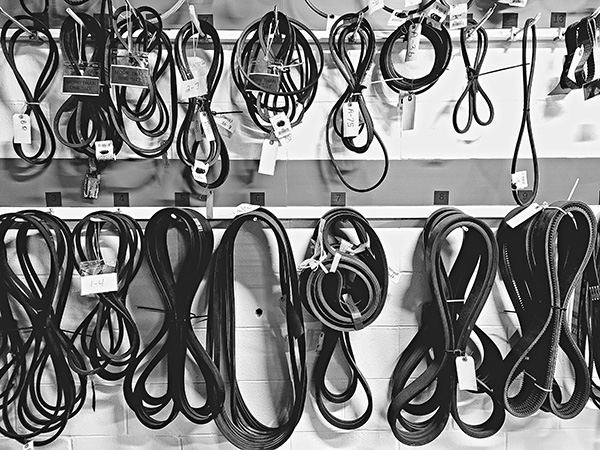
Your vehicle’s timing belt or chain may be one of your engine's most critical yet overlooked components. It keeps everything in sync, ensuring the pistons and valves work together precisely. But what happens if it breaks while you’re driving? It’s a serious issue that could leave you stranded and cause significant engine damage.
The Timing Belt and Chain
A timing belt or chain connects the crankshaft and camshaft, two components essential to the operation of your engine. They make sure that the engine’s intake and exhaust valves open and close in perfect sync with the movement of the pistons. Most modern cars have a rubber timing belt, which is quieter and less expensive to replace, while some high-performance vehicles rely on timing chains for added durability. Regardless of which one your car uses, they’re both equally crucial for keeping your engine running correctly.
Timing belts are typically recommended for replacement every 60,000 to 100,000 miles, depending on the vehicle make and model. Chains, on the other hand, generally last longer but still require inspections to ensure they’re functioning properly. Ignoring these intervals could mean setting yourself up for a major breakdown.
Why Do Timing Belts and Chains Break
Timing belts and chains are subject to a great deal of stress and wear over time. Here are some common reasons why they might fail:
- Aging or Mileage: Over time, the materials in timing belts degrade. For belts, especially rubber ones, age, and high mileage mean a higher chance of breaking.
- Lack of Maintenance: Neglecting regular inspections can mean missing signs of wear. Timing chains can also suffer from a lack of lubrication if the engine oil isn’t maintained.
- Tensioner Failure: The timing belt or chain relies on tensioners to keep it tight. If the tensioner fails, the belt or chain could slip, skip, or even snap.
Understanding why they break is important, but knowing the consequences can be eye-opening.
What Happens When the Timing Belt or Chain Breaks
When your timing belt or chain breaks while driving, the effects are immediate and often dramatic. Here’s what can happen depending on your engine type.
Interference Engines vs. Non-Interference Engines
The impact of a broken timing belt or chain often depends on whether your vehicle has an interference or non-interference engine.
Interference Engines
In these engines, the pistons and valves share the same space but at different times, depending on the timing. If the timing belt or chain snaps, it can cause the pistons to collide with open valves, resulting in serious internal damage. This can mean bent valves, damaged pistons, and, in severe cases, a cracked engine block. Repairing these damages can be extremely costly, often requiring a full engine rebuild or replacement.
Non-Interference Engines
In these engines, the pistons and valves operate in separate spaces, meaning they won’t physically collide if the timing belt breaks. While this might save you from extensive engine damage, your car will still come to a halt, and you’ll likely need a tow. Although repairs are less extensive than those with an interference engine, you’ll still face expenses when replacing the belt or chain.
Complete Engine Shutdown
When the timing belt or chain breaks, it interrupts the timing of the engine, causing the entire system to shut down immediately. This can be particularly dangerous if it happens at high speed or in heavy traffic, as you may lose control of essential functions like steering and brakes. Without the timing belt or chain’s guidance, the engine will stall, leaving you to coast to the side of the road.
Internal Engine Damage
Even in engines designed to minimize damage, a broken timing belt or chain can still cause problems. When these components fail, moving parts may be thrown off alignment, potentially leading to damaged cylinder heads, bent connecting rods, and fractured crankshafts. Such damages can result in a costly repair bill, with engine rebuilds running into the thousands of dollars.
Signs Your Timing Belt or Chain Might Be Failing
Catching timing belt or chain issues early can save you from sudden breakdowns and costly repairs. Here are some warning signs to watch for:
- Engine Misfires: Misfiring can be an early sign that the timing belt or chain is slipping, causing the engine’s timing to be off.
- Ticking Noise from the Engine: A worn-out timing belt or chain can make a ticking or rattling sound as it struggles to keep the engine in sync.
- Oil Leaks Near the Engine: Timing belts are often protected by a cover, which can deteriorate over time. If you notice oil leaking from this area, it could be a sign that the belt is wearing down.
- Engine Won't Start: If your timing belt or chain has already broken, the engine will crank but not start because it can’t establish timing.
If you notice any of these warning signs, it’s best to schedule an inspection to avoid a sudden breakdown.
Don’t wait for your timing belt to fail! Schedule an appointment with Bimmer Motor Specialists now and avoid expensive repairs with timely maintenance. We’re here to help keep your engine running at its best.